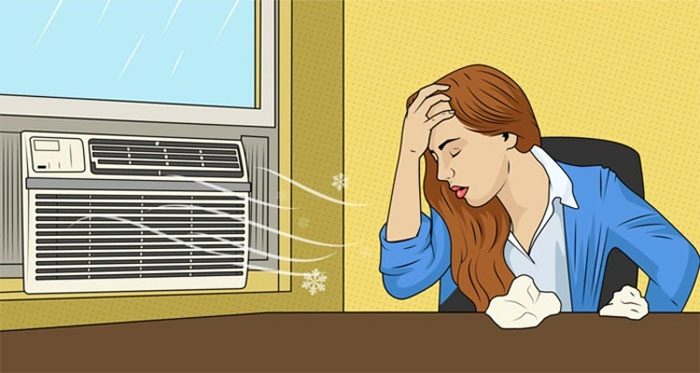Many people avoid air-conditioned rooms due to the discomfort known as “air conditioning sickness.”
Air conditioning sickness is a term used by many to describe feelings of nausea, headaches, and dizziness when entering an air-conditioned room. This phenomenon is common and prevents many individuals from enjoying the coolness provided by air conditioning.
In reality, air conditioning sickness is not a medical condition and there is no specific medical term for this phenomenon. However, according to health experts, those who frequently experience nausea and dizziness upon entering air-conditioned spaces share common characteristics.

Air conditioning sickness describes the feelings of nausea and headaches that many experience when entering an air-conditioned room.
In an interview, Associate Professor Dr. Nguyen Hoai Nam (University of Medicine and Pharmacy in Ho Chi Minh City) stated that the ability to adapt to temperature changes varies among individuals. Many people experience air conditioning sickness because they cannot adjust to the temperature. Sudden temperature changes can cause blood vessels to constrict, leading to localized blood flow issues in areas such as the brain, resulting in headaches and dizziness, or in facial blood vessels, leading to a pale complexion.
Psychological factors can also contribute to air conditioning sickness, as many individuals have a fear of thermal shock from their first experiences with air conditioning.
Experts recommend that to avoid air conditioning sickness during hot days, individuals should maintain the air conditioning temperature at a moderate level, not differing too much from the outdoor temperature. The ideal temperature to prevent thermal shock is around 25 – 28 degrees Celsius.
Additionally, users should keep their rooms well-ventilated and tidy, disposing of unnecessary items to create a more comfortable psychological environment.

Bacteria can proliferate in the air conditioning unit and its filters, causing unpleasant odors and musty smells. (Image: Panasonic)
Experts advise households to clean air conditioners every six months to avoid unpleasant odors and mustiness that can induce nausea. This is due to the accumulation of dust and grease in the cooling unit and filters over time. These layers of dirt can promote mold growth, releasing foul-smelling air.
Moreover, if your air conditioner emits a gas smell when turned on, there is a high possibility that the gas line is leaking. Gas is highly toxic and can cause not only unpleasant odors that lead to headaches and nausea but also potential poisoning or fainting if inhaled excessively. In such cases, users should immediately notify repair services for timely inspection to prevent serious health consequences.




















































